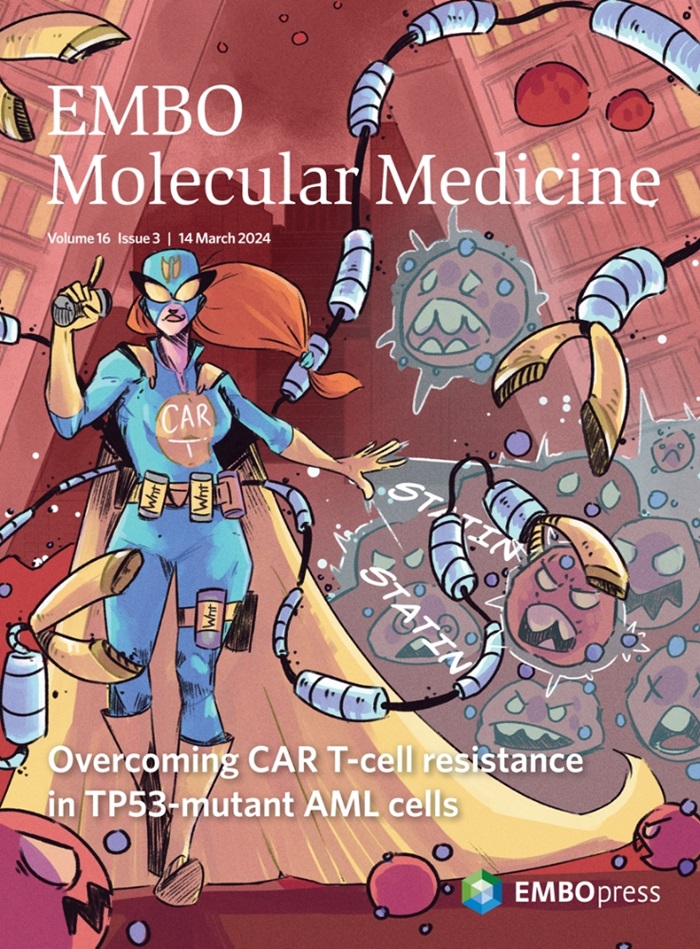Peptidomic analysis of CSF reveals new biomarker candidates for amyotrophic lateral sclerosis.
IF 9
1区 医学
Q1 MEDICINE, RESEARCH & EXPERIMENTAL
引用次数: 0
Abstract
Amyotrophic lateral sclerosis (ALS) is a devastating neurodegenerative disease, and novel biomarkers are needed. We applied mass-spectrometry-based peptidomic analysis in cerebrospinal fluid (CSF) samples of ALS and non-neurodegenerative control patients (Con) from a discovery (n = 48) and validation (n = 109) cohort for biomarker discovery. Systematic selection revealed a panel of eight novel peptide biomarker candidates for ALS (out of 33,605) derived from seven proteins. In the validation cohort, NFL, MAP1B, MYL1, and APOC1 peptides were upregulated, and peptides from CADM3, SCG1, and PENK were downregulated in ALS compared to Con. The peptides (except NFL) were not changed in other neurodegenerative diseases, including Alzheimer´s disease, frontotemporal dementia and Parkinson´s disease. Combination of all peptides in a logistic regression model led to an area under the curve value of 98% for the discrimination of ALS from controls. Data of the NFL peptide strongly correlated with an established NFL immunoassay (Ella, r = 0.97). The peptide biomarker candidates are derived from proteins with different function, and their determination with our method provides the opportunity for simultaneous investigation of key processes in ALS.脑脊液的肽组学分析揭示了肌萎缩侧索硬化症的新生物标志物候选物。
肌萎缩侧索硬化症(ALS)是一种毁灭性的神经退行性疾病,需要新的生物标志物。我们对发现(n = 48)和验证(n = 109)队列的ALS和非神经退行性对照患者(Con)的脑脊液(CSF)样本进行了基于质谱的肽组学分析,以发现生物标志物。系统选择显示了一组来自7种蛋白质的8种新的ALS肽生物标志物候选物(来自33,605种)。在验证队列中,与con相比,ALS中NFL、MAP1B、MYL1和APOC1肽上调,CADM3、SCG1和PENK肽下调。在其他神经退行性疾病(包括阿尔茨海默病、额颞叶痴呆和帕金森病)中,这些肽(NFL除外)没有改变。在逻辑回归模型中,所有肽的组合导致曲线下面积为98%,用于区分ALS与对照。NFL肽的数据与建立的NFL免疫分析密切相关(Ella, r = 0.97)。候选肽生物标志物来源于具有不同功能的蛋白质,用我们的方法测定它们为同时研究ALS的关键过程提供了机会。
本文章由计算机程序翻译,如有差异,请以英文原文为准。
求助全文
约1分钟内获得全文
求助全文
来源期刊

EMBO Molecular Medicine
医学-医学:研究与实验
CiteScore
17.70
自引率
0.90%
发文量
105
审稿时长
4-8 weeks
期刊介绍:
EMBO Molecular Medicine is an open access journal in the field of experimental medicine, dedicated to science at the interface between clinical research and basic life sciences. In addition to human data, we welcome original studies performed in cells and/or animals provided they demonstrate human disease relevance.
To enhance and better specify our commitment to precision medicine, we have expanded the scope of EMM and call for contributions in the following fields:
Environmental health and medicine, in particular studies in the field of environmental medicine in its functional and mechanistic aspects (exposome studies, toxicology, biomarkers, modeling, and intervention).
Clinical studies and case reports - Human clinical studies providing decisive clues how to control a given disease (epidemiological, pathophysiological, therapeutic, and vaccine studies). Case reports supporting hypothesis-driven research on the disease.
Biomedical technologies - Studies that present innovative materials, tools, devices, and technologies with direct translational potential and applicability (imaging technologies, drug delivery systems, tissue engineering, and AI)
 求助内容:
求助内容: 应助结果提醒方式:
应助结果提醒方式:


